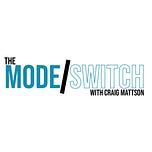Volume 1, Issue 20
Two articles about young professionals dropped down my feed this week. One reported how burned-out young professionals like you feel, which is pretty familiar terrain for the Mode/Switch. The other warned that people like you are going to hate your new job when you quit the one you have now. But one thing I noticed is a pair of underlying stories we like to tell about early-career professionals. I bet you’re sick of hearing these narratives:
Story #1 - Gen Zs are quirky fixers. They don’t care about salary. They do care about equity and the environment. And they’re gonna use cool tech to flip the world, just you watch and see.
Story #2 - Gen Zs are pillow-huggers. They have no resilience. They do have pink headphones. But just as soon as the job gets hard, they quit and move on, just you watch and see.
Put them together, and this story makes little sense: Gen Zs can’t be both sovereign changemakers and coddled Shih-Tzus needing a crate and a treat. So, here’s a thing I’d like to say to the click-baity business journalists writing about Gen Zs. Please slow down. You’re missing stuff. And without meaning to, you’re reinforcing a weird duality in which the Youth as Powerful are somehow also the Youth as Coddled.
Let’s just say that these aren’t the brightest takes in the history of intergenerational social science. They remind me of a story from my family kitchen a decade back.
It’s 6:37 in the morning, and the household is a storm of preparation. If it’s like most mornings in our kitchen, one of our older kids is complaining and another is telling about a dream the night before. My partner and I are silently loading our backpacks for a day of graduate study and undergraduate teaching.
Our four-year-old son is sitting on a stool at the counter, staring at the rest of us, his blue eyes swiveling from person to person, calculating. Before him is a spoon, which he had to stand on a stool to pull down from the dish rack. He also has a yellow cereal bowl, which he got from the second shelf of the cupboard by defying all known laws of physics. At the moment, he has his hands on either side of an unopened cereal box. No, wait, the box isn’t unopened exactly. He has ripped the cardboard top with such violence that the box will never again shut properly. But he is having no luck with the plastic bag inside. Despite repeated pulls, nothing gives.
“Could someone get this open—?” he says for the second or third time that morning. I’m sure that tiny hairs on the basilar membranes of the inner ears of everyone else in the room stir briefly at these words. I am sure that little nerve signals shoot from our cochleas to our brainstems. But these auditory events happen without translating into assistance for the tyke on the bar stool. The attention economy is hard on you when you’re four years old, and so, he shouts out in the fracas of busy-morning kitchenhood,
ALL I NEED IS HELP!
A silence settles over the morning like a spirit over the waters. The avid talkers stop their talking. The hurried lunch-packers freeze. The desperate counter-cleaner ceases from her labors. I turn a startled gaze from the brim of my coffee. The little guy at the counter holds toward us a box of Honey Nut Cheerios.
One of us probably helped him unseal the bag. But I think we mostly missed the wisdom out of the mouth of a child.
Standpoint theorists tell us that if you want to understand the culture of any place, you should not ask the big people. The big people in the room always hold the capital—economic and social and symbolic—and so they can afford to ignore the little people. What’s usually overlooked is that the big people fail to face their own overwhelm by avoiding the overwhelm of the little people.
I wish I could go back to that kitchen and tell the me of ten years ago that the little person on the stool was a smart person in the room, maybe the smartest person in the room. Back then, I could only see what I was crossing off my list and putting in my satchel. He, on the other hand, could see both my overwhelm and his. That doubled perspective, in which he saw both what was going for us in the center of power and what was going on for him at the margins of power, gave him what standpoint theorists would call a strong objectivity. What communication theorists like Julia Wood and Sandra Harding mean by a term like that is that the kid’s way of seeing things was actually the most vital perspective in the room.
I might translate that perspective this way: whatever our generation, all any of us ever needs is help.
If you’ve been reading this Substack for long, you know that I try to base the insights here on my qualitative research among Gen Zs and late millennials. When it works, this research helps you do more than cope when work’s too much. Look, the overwhelm you feel is not entirely unique to your experience; it’s just that the rest of us can afford, for whole hours at a time, to ignore how excessive life and work can be. Or worse, we deal with our overwhelm by passing it onto you instead of treating overwhelm as common ground with you.
I wish I could go back a decade and sit on the stool next to the cereal-box struggler. Looking at the kitchen from his early morning overwhelm might make clear something about my own—that what we all need is not so much assistance as alliance.
Who I’m Learning From
Ada Limon's poetry
Her poetry reminds me of an ancient practice called memento mori, which means, remember that you must die. One of the gains of that seemingly morbid practice is its constant reminder that we are all dependent creatures perpetually embedded in situations where we need help, sometimes desperately. I use the word “embedded” deliberately: the word points toward the ways that the truest character of our overwhelm is that we are entangled, caught up, suspended in ecologies that at one and the same time press down on us and keep us alive. To be overwhelmed is to belong, sometimes subtly, sometimes obviously, always excessively, to the people and places around you.
Andy Root's book Faith Formation in a Secular Age: Responding to the Church's Obsession with Youthfulness
A lot of popular business articles like to talk about the power and autonomy enjoyed by Gen Z professionals: there is, as Andrew Root has pointed out, a cult of youthfulness integral to late modernity. And there is also a mythology of freedom and autonomythat makes up our favorite story to tell about ourselves, not least about the youngest among us.
Thanks for reading this 20th edition of The Mode/Switch. What workplace topic, especially around Gen Z and millennials, do you wish we had covered? Reply to this note and tell me!
Please. - Craig
















Share this post